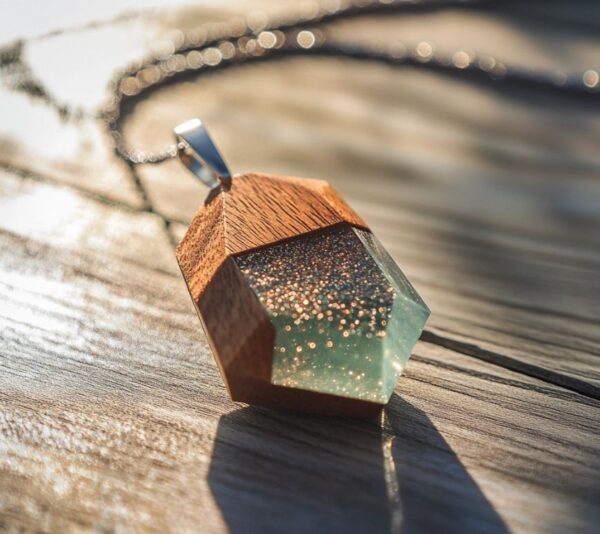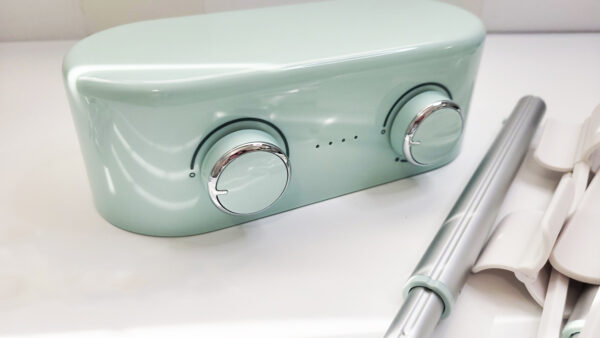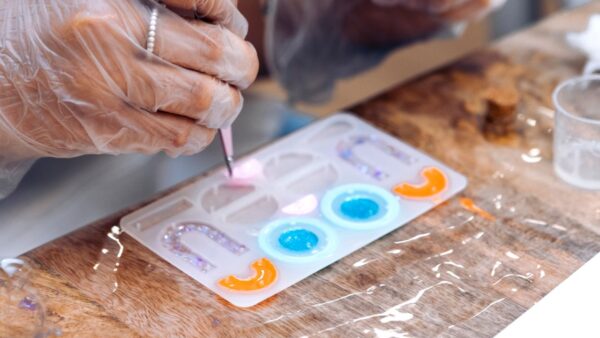9 Best Resins For Stabilizing Wood [2025]
Here are the best resins for stabilizing wood. In the world of woodworking, one essential skill that can truly transform your projects is the art of stabilizing wood. This is your guide to choosing the absolute best resins for stabilizing wood.
Whether you’re a seasoned craftsman or just starting out, choosing the right resin is an important step. Some resins are not made as well as others. We work with resin all the time so we have some really great advice for your wood projects.
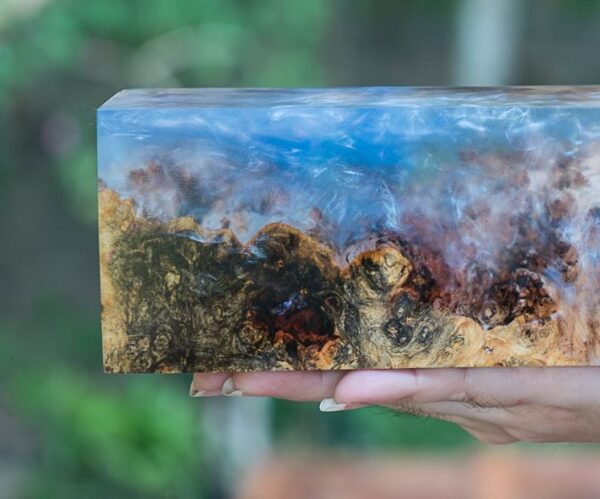
We’ll be exploring a handpicked selection of resins that add stability & durability to your woodworking ventures.
So, grab a seat, get ready to learn, and let’s dive into the wonderful world of wood stabilization together.
Best resins for stabilizing wood
1. Pentacryl PRO Wood Resin
Pentacryl is a wood stabilizer that is specifically designed to prevent cracking, splitting, and warping in green or freshly cut wood. This is one of the very best resins for wood stabilization.
Unlike traditional wood stabilizers that harden the wood, Pentacryl works by replacing water in the wood cells with a polymer.
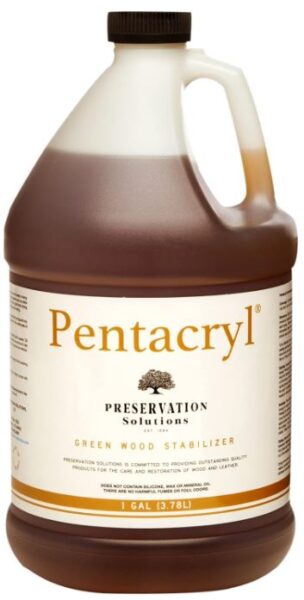
This process helps to retain the wood’s flexibility and natural characteristics while significantly reducing the risk of drying-related defects.
Woodworkers often use Pentacryl on green wood, such as logs or turning blanks, to stabilize the wood before further processing.
It is particularly useful for wood with high moisture content, minimizing the likelihood of cracks and checking as the wood dries.
2. CACTUS JUICE For Wood
Cactus Juice has gained popularity in woodworking circles primarily for its effectiveness in stabilizing wood. This is my second choice and it has excellent feedback from other resin users too. As far as resins for wood stabilization goes, this is a top choice because it works very well.
As a resin-based stabilizer, Cactus Juice penetrates the cellular structure of the wood, replacing air pockets with a durable and solid material.
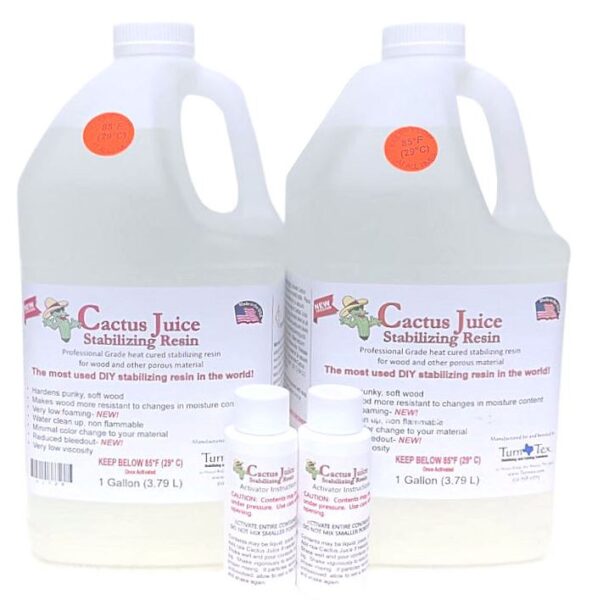
This process significantly enhances the wood’s stability, reducing the risk of warping, cracking, and decay. Woodworkers appreciate Cactus Juice for its ease of use, quick curing time, and ability to preserve the natural color and grain of the wood.
3. ECOPOXY for wood
Ecopoxy is a well-regarded brand known for its high-quality epoxy resin products, often used in various woodworking applications, including stabilization.
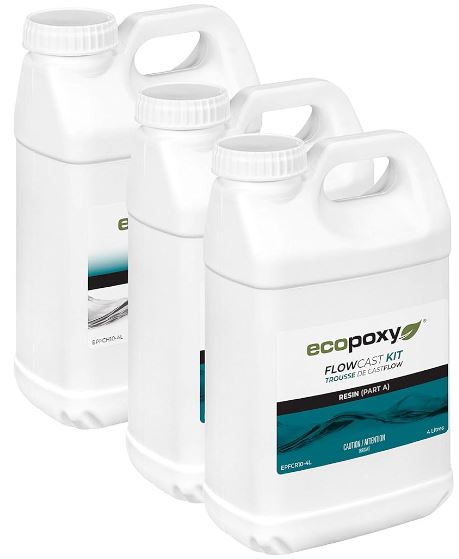
The brand offers a range of resins suitable for different projects, providing options with excellent penetration, adhesion, and UV resistance, making them suitable for stabilizing wood effectively.
4. SOS 3.0 Resin For Wood
The SOS 3.0 Stabilizing Resin for Wood offers a curing temperature range of 190-220°F, providing flexibility in application.
Notably, it has minimal bleedout compared to other resins, so you have a cleaner and more controlled stabilization process.
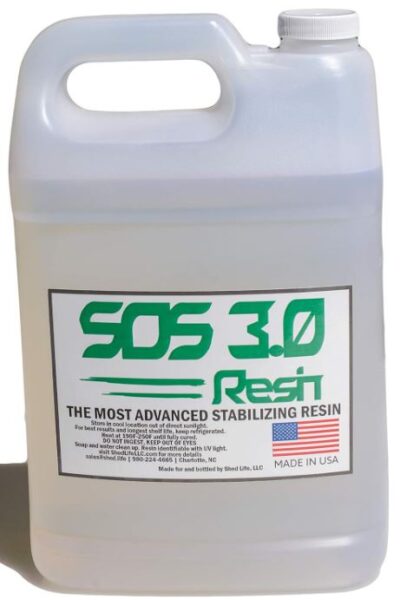
Under vacuum conditions, this resin exhibits almost zero foaming, contributing to a smooth and bubble-free finish. Furthermore, users can expect improved hardness and enhanced polishing characteristics post-cure.
5. Beast Bond Resin For Wood Projects
A good option for stabilizing wood is the Beast Bond resin. Its formula involves establishing a molecular bond with the wood surface upon application.
So this gives the wood a protective resin-coated layer that enhances durability. It also shields the wood from potential damage and wear.
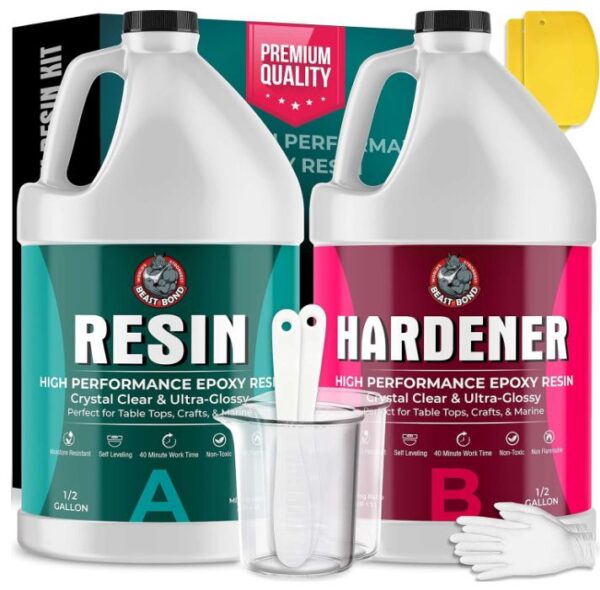
6. Stick Fast Stabilizing Resin
The Stick Fast stabilizing resin is a popular resin for woodcrafters. It will harden soft, porous wood for smooth cutting. You can also add resin thermochromic colorants to it if you need different shades or colors in the wood.
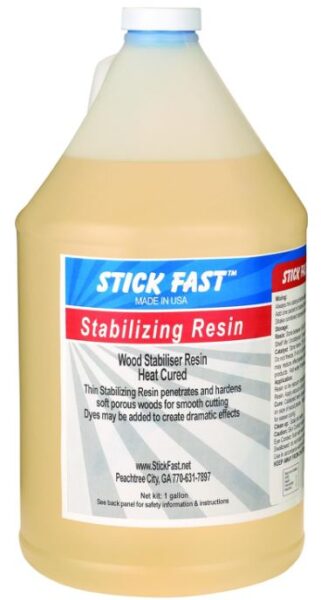
Utilizing heat, this product penetrates the wood, securely locking in the resin and enhancing the overall aesthetics of the finished piece.
7. Superclear Epoxy for wood
Superclear epoxy for wood is a popular choice among woodworkers and DIY enthusiasts for its versatile applications and clear, glossy finish.
This epoxy is specifically formulated for woodworking projects, providing a crystal-clear appearance that enhances the natural beauty of wood.
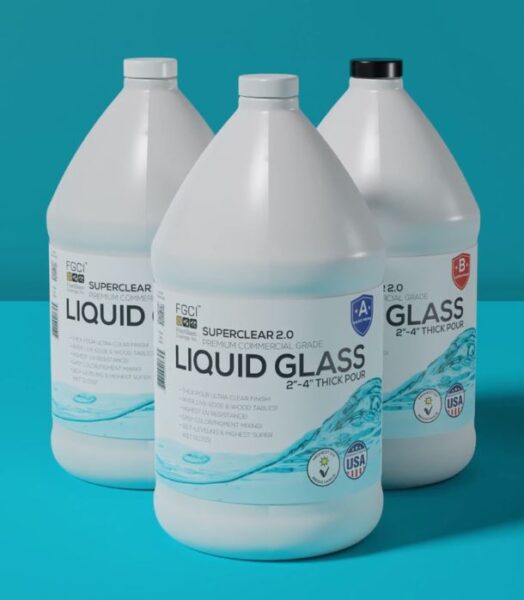
It is often used for coating, casting, and embedding applications, offering excellent adhesion and durability.
SuperClear epoxy is known for its self-leveling properties, minimizing the need for extensive sanding and finishing work.
8. Promise Epoxy for wood
One notable feature is its ability to create a durable and clear finish on wood surfaces, enhancing the wood’s natural beauty.
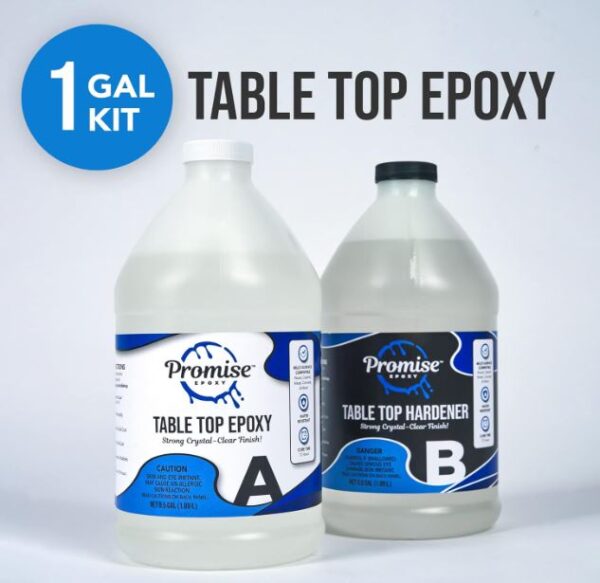
It is commonly used for coating, laminating, and sealing wood, offering excellent adhesion and resistance to resin yellowing over time.
Promise Epoxy typically cures to a glossy, smooth surface, providing a professional look to finished projects.
9. Clearcast 7000 for woodworkers
Many users appreciate its relatively quick curing time so you can get on to the next step of your wood projects.
As with any epoxy resin, it’s important to follow the manufacturer’s guidelines for proper mixing and application to get the right results. If you do not mix epoxy resin properly, it might not cure completely.
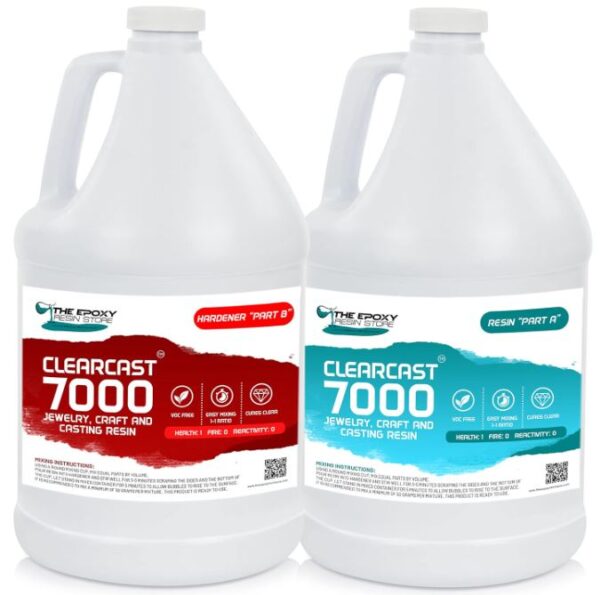
Clearcast 7000 is favored by woodworkers for its reliability and ability to deliver a polished and durable finish on various woodworking DIY’s.
resin wood stabilization faq
Why should I consider stabilizing wood with resin?
1. Durability: Resin stabilization significantly enhances the durability of wood. It helps prevent common issues such as warping, cracking, and decay, ensuring that your finished projects withstand the test of time.
2. Moisture Resistance: Wood is susceptible to moisture absorption, which can lead to swelling and contraction. Stabilizing wood with resin reduces its ability to absorb water, making it more resistant to changes in humidity and less prone to damage from moisture.
3. Enhanced Strength: Resin adds structural integrity to the wood, reinforcing its overall strength. This is particularly beneficial for projects that undergo stress, pressure, or potential impacts.
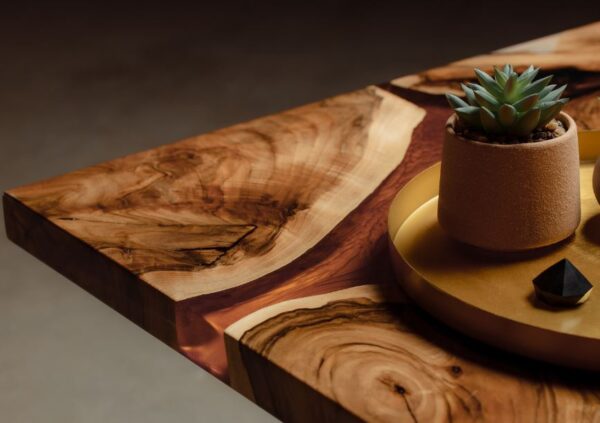
4. Prevention of Decay and Rot: Stabilizing wood inhibits the growth of fungi and bacteria that can lead to decay and rot. This is crucial, especially for outdoor projects or items exposed to varying environmental conditions.
5. Improved Workability: Stabilized wood tends to be more dimensionally stable, making it easier to work with during the crafting process. It reduces the likelihood of distortion or changes in shape, allowing for more precise and controlled woodworking.
6. Aesthetic Enhancement: Certain resins can enhance the natural beauty of wood, enriching its color and grain. This not only contributes to the visual appeal of your projects but also provides a polished and professional finish.
7. Protection from UV Rays: Some resins offer UV resistance, protecting the wood from the harmful effects of sunlight. This is particularly important for projects that will be exposed to outdoor conditions, preventing discoloration and degradation over time.
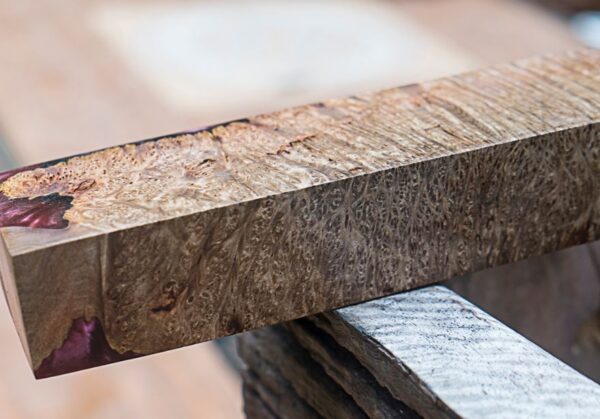
In summary, stabilizing wood with resin is a practical and effective way to ensure the longevity, strength, and aesthetic quality of your woodworking creations.
Whether you’re crafting furniture, turning bowls, or engaging in other woodworking pursuits, the stabilization process can add considerable value to your finished pieces.
Can stabilized wood be used for outdoor projects?
Absolutely! Stabilizing wood with the right resin can make it suitable for outdoor applications by enhancing its resistance to moisture, UV rays, and temperature fluctuations. Just ensure you choose a resin with excellent weather-resistant properties for optimal results.
Can I use any type of resin for stabilizing wood?
Not all resins are created equal. Choose a resin specifically designed for wood stabilization, considering factors like penetration, adhesion, and compatibility with the wood type. Epoxy resins and acrylic-based stabilizers are popular choices.
How long does the stabilization process take, and is it complicated?
The duration varies based on the resin and project. Generally, the stabilization process can take a few hours to a day, but curing may continue over a longer period. The complexity depends on your familiarity with the chosen resin; some are straightforward, while others may require more precise application.
Will stabilized wood maintain its natural appearance?
Yes, quality stabilizing resins aim to preserve the wood’s natural color and grain. Always follow the manufacturer’s guidelines to achieve the desired aesthetic results.
Tips For Choosing The Right Resin For Wood Stabilization
Compatibility with Wood Types
Ensure that the resin you choose is compatible with the type of wood you’re working with.
Different resins may interact differently with various wood species, affecting the stabilization process and the final result.
Penetration and Adhesion
Look for a resin that has excellent penetration and adhesion properties. The resin should effectively seep into the wood’s pores, ensuring thorough stabilization.
Additionally, strong adhesion guarantees a lasting bond, enhancing the wood’s overall durability.
Curing Time and Process
Consider the curing time of the resin and the process involved. Some projects may require a quicker curing time, while others benefit from a slower, more controlled process.
Understanding the resin’s curing characteristics will help you plan your project timeline accordingly.
We have a helpful article all about the cure times of resin.
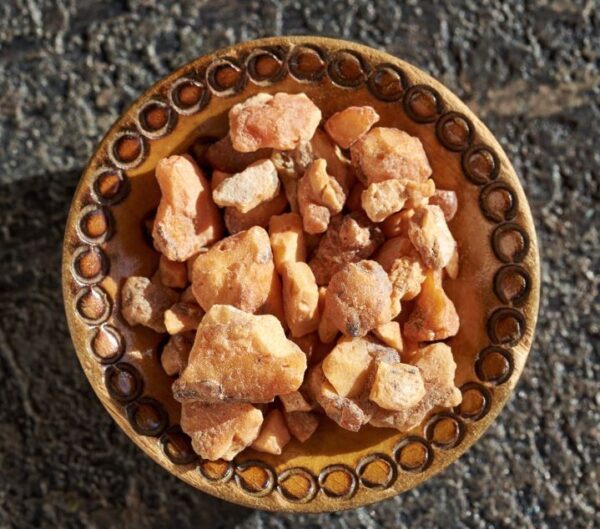
Clarity and Aesthetics
If the visual appeal of your project is a priority, opt for a resin that maintains the natural color and grain of the wood.
Some resins may have a yellowing effect over time, so choose one that promises clarity and won’t compromise the aesthetics of your finished piece.
UV Resistance and Durability
Assess the resin’s UV resistance, especially if your woodwork will be exposed to sunlight. UV-resistant resins help prevent discoloration and degradation over time.
Additionally, prioritize resins that offer long-term durability, ensuring your stabilized wood projects withstand the test of time and environmental factors.
In Closing: We hope this blog post helped with your wood projects and you now have found the best resins for wood stabilization. If you have a favorite or tips for readers, leave your comments below. Happy crafting.

